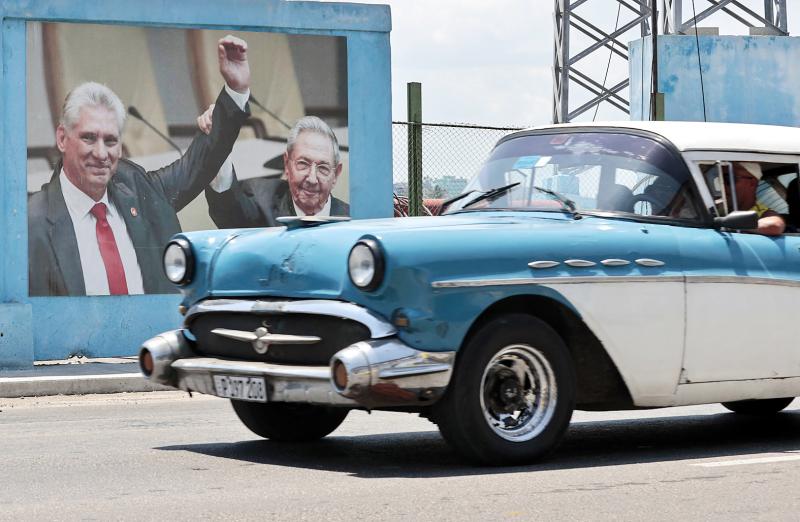Cuba’s National Assembly on Wednesday ratified Cuban President Miguel Diaz-Canel for a new five-year term, in a decision to maintain continuity as the country faces a deep economic crisis.
More than 400 representatives to the assembly who were ratified by voters last month took office early on Wednesday and then convened the chamber to elect the government’s leadership and the president. Diaz-Canel obtained the votes of 459 of the 462 legislators present.
Cuban Vice President Salvador Valdes Mesa was also ratified, by 439 votes.

Photo: EPA-EFE
In his new term, Diaz-Canel must deal with a severe recession prompted by the COVID-19 pandemic, soaring inflation triggered by a series of financial policy decisions and strict sanctions imposed by the US.
He must also grapple with discontent among many Cubans expressed in part through record rates of emigration to the US and elsewhere.
Among the measures his team would be focusing on “immediately,” Diaz-Canel said, are food production, an increase in exports and the development of “socialist-state enterprise.”
He added that controlling inflation is a priority in the country’s “economic battle.”
Diaz-Canel, a slow-talking, gray-haired former engineer who turns 63 this week, also heads the Communist Party of Cuba.
In 2018, he became Cuba’s first leader in six decades not surnamed Castro, after former Cuban president Raul Castro went into semi-retirement following his stint as president. He had taken over from his brother, Cuba’s revolutionary leader Fidel Castro, in 2016.
The country had “hopes of political and economic changes” at the time, but Diaz-Canel instead has become the standard-bearer of continuity, said Luis Carlos Battista, a Cuban-American analyst and lawyer living in Washington.
“The president, five years after being ratified by the National Assembly, has not yet managed to convey to the public an idea of progress,” Battista said.
In recent years, the economy has collapsed, with GDP falling 11 percent in 2020 after the pandemic struck. Inflation from January to October of last year was 40 percent at official rates — and even more when the black market is taken into account.
In July 2021, Diaz-Canel faced the country’s first major wave of protests in at least two decades, which left one dead, stores vandalized and vehicles destroyed, and which the government accused groups in the US of fomenting.
Cuba saw about 330,000 citizens leave for the US between October 2021 and December last year, a record number. Others departed for other countries in Latin America and Europe.
“The panorama is quite bleak,” said Michael Shifter, a member of the Inter-American Dialogue organization and an adjunct professor at Georgetown University.
He said the president’s “main challenge will be to activate the economy.”

Kehinde Sanni spends his days smoothing out dents and repainting scratched bumpers in a modest autobody shop in Lagos. He has never left Nigeria, yet he speaks glowingly of Burkina Faso military leader Ibrahim Traore. “Nigeria needs someone like Ibrahim Traore of Burkina Faso. He is doing well for his country,” Sanni said. His admiration is shaped by a steady stream of viral videos, memes and social media posts — many misleading or outright false — portraying Traore as a fearless reformer who defied Western powers and reclaimed his country’s dignity. The Burkinabe strongman swept into power following a coup in September 2022

‘FRAGMENTING’: British politics have for a long time been dominated by the Labor Party and the Tories, but polls suggest that Reform now poses a significant challenge Hard-right upstarts Reform UK snatched a parliamentary seat from British Prime Minister Keir Starmer’s Labor Party yesterday in local elections that dealt a blow to the UK’s two establishment parties. Reform, led by anti-immigrant firebrand Nigel Farage, won the by-election in Runcorn and Helsby in northwest England by just six votes, as it picked up gains in other localities, including one mayoralty. The group’s strong showing continues momentum it built up at last year’s general election and appears to confirm a trend that the UK is entering an era of multi-party politics. “For the movement, for the party it’s a very, very big

A new online voting system aimed at boosting turnout among the Philippines’ millions of overseas workers ahead of Monday’s mid-term elections has been marked by confusion and fears of disenfranchisement. Thousands of overseas Filipino workers have already cast their ballots in the race dominated by a bitter feud between President Ferdinand Marcos Jr and his impeached vice president, Sara Duterte. While official turnout figures are not yet publicly available, data from the Philippine Commission on Elections (COMELEC) showed that at least 134,000 of the 1.22 million registered overseas voters have signed up for the new online system, which opened on April 13. However,

ENTERTAINMENT: Rio officials have a history of organizing massive concerts on Copacabana Beach, with Madonna’s show drawing about 1.6 million fans last year Lady Gaga on Saturday night gave a free concert in front of 2 million fans who poured onto Copacabana Beach in Rio de Janeiro for the biggest show of her career. “Tonight, we’re making history... Thank you for making history with me,” Lady Gaga told a screaming crowd. The Mother Monster, as she is known, started the show at about 10:10pm local time with her 2011 song Bloody Mary. Cries of joy rose from the tightly packed fans who sang and danced shoulder-to-shoulder on the vast stretch of sand. Concert organizers said 2.1 million people attended the show. Lady Gaga